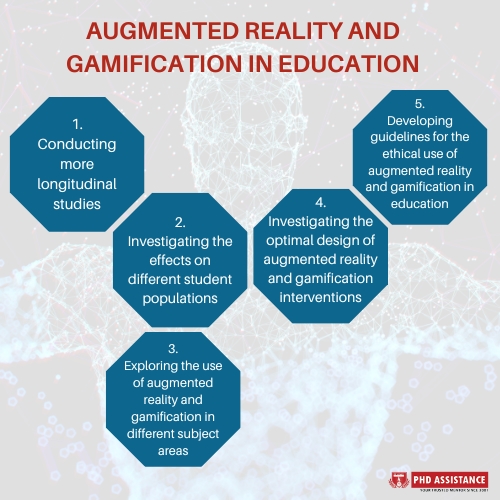What are the future recommendations in the following paper, “Augmented Reality and Gamification in Education: A Systematic Literature Review of Research, Applications, and Empirical Studies.”
This blog analyzed the current literature review on the application of augmented reality and gamification in education. When used in a student-centred manner, following proper educational approaches and strategies, and taking students’ knowledge, interests, unique characteristics, and personality traits into consideration, the results showed that using augmented reality and gamification in education can yield several benefits for students, assist educators, improve the educational research process, and facilitate the transition towards technology-enhanced learning.
Introduction
The paper “Augmented Reality and Gamification in Education: A Systematic Literature Review of Research, Applications, and Empirical Studies” provides several recommendations for future research in this field. These recommendations include:

- Conducting more longitudinal studies: The authors suggest that future studies should focus on the longer-term effects of using augmented reality and gamification in education. This could provide a more accurate understanding of how these technologies can impact learning outcomes over time.
- Investigating the effects on different student populations: The authors recommend that future studies investigate the effects of augmented reality and gamification on different student populations, such as students with different learning styles or cultural backgrounds.
- Exploring the use of augmented reality and gamification in different subject areas: The authors suggest that future studies should investigate the use of these technologies in different subject areas, such as science, technology, engineering, mathematics (STEM), and humanities.
- Investigating the optimal design of augmented reality and gamification interventions: The authors recommend that future studies investigate the design features of augmented reality and gamification interventions that are most effective for promoting learning outcomes.
- Developing guidelines for the ethical use of augmented reality and gamification in education: The authors suggest that future research statements should focus on developing guidelines for the ethical use of these technologies in education, such as ensuring that they are not used to promote inappropriate or harmful behaviours.
Overall, the blog provides a helpful guide for future research on augmented reality and gamification in education, highlighting the critical gaps in the existing literature and providing suggestions for future directions.
Conclusion
This blog aimed to examine the available literature on the application of gamification and augmented reality in education. As a result, a comprehensive literature review was conducted. According to the findings, using them in teaching and learning activities can improve the educational process while supporting instructors and providing multiple student benefits. Furthermore, its incorporation into education eases the transition to technology-enhanced learning. However, for all of this to be accomplished, its integration must adhere to correct educational methodologies and approaches, place students at the centre, and consider students’ knowledge, interests, unique qualities, and personality traits.
PhD Assistance
Our PhD specialists will thoroughly examine relevant published research on important theoretical concepts or models on which you want to base your dissertation—we at PhD. Assistance assists in developing an extensive literature review comprised of various academic sources such as journals, textbooks, and newspaper articles to develop a research framework / conceptual framework, hypothesis, and questionnaire with appropriate sources favouring dissertation title.
References
Lampropoulos, G.; Keramopoulos, E.; Diamantaras, K.; Evangelidis, G. Augmented Reality and Gamification in Education: A Systematic Literature Review of Research, Applications, and Empirical Studies. Appl. Sci. 2022, 12, 6809. https://doi.org/10.3390/app12136809
 Previous Post
Previous Post Next Post
Next Post
